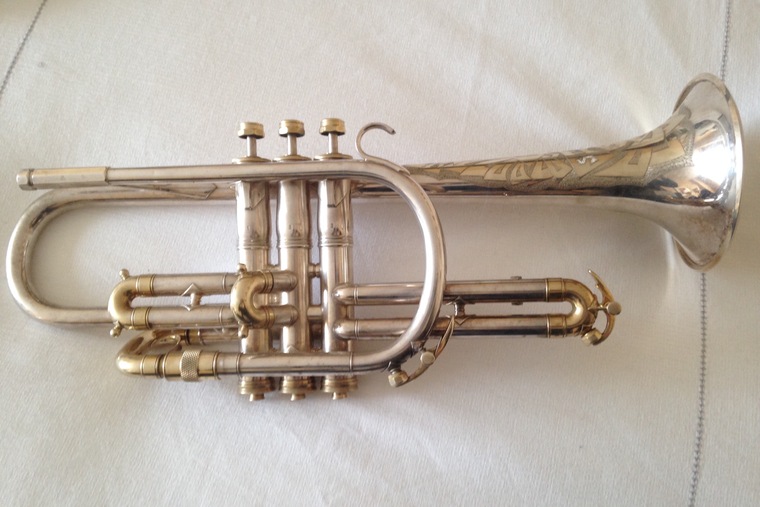I am a total believer in putting it on your face and not thinking about it - let it work where it’s naturally meant to work. If we were all the same, than the same formula for placement or equipment would work for everyone. I have seen people destroy themselves by overthinking and changing for no real reason other than to see if “maybe it works better over here”, or trying to get some textbook formula of placement. I have seen students struggle because teachers told them their teeth had to align perfectly before they could play, so the student spent several minutes trying to line up teeth and embouchure every time they tried to play, and all sorts of other foolishness. Unless your embouchure is truly messed up and weird, it’s better not to mess with it, especially over the internet where no one can really see what you’re doing. A couple of lessons to make sure you’re not damaging yourself with a good teacher would be the way to go.
Best posts made by flugelgirl
-
RE: Thoughts about mouthpiece placementposted in Embouchure and Air
-
RE: Christmas themed pics of your hornposted in Lounge
Here’s one I took for work - that’s our mascot, Primo! Head tech made him out of old mutes and woodwind mouthpieces and caps. I’ve started taking yearly holiday photos of him


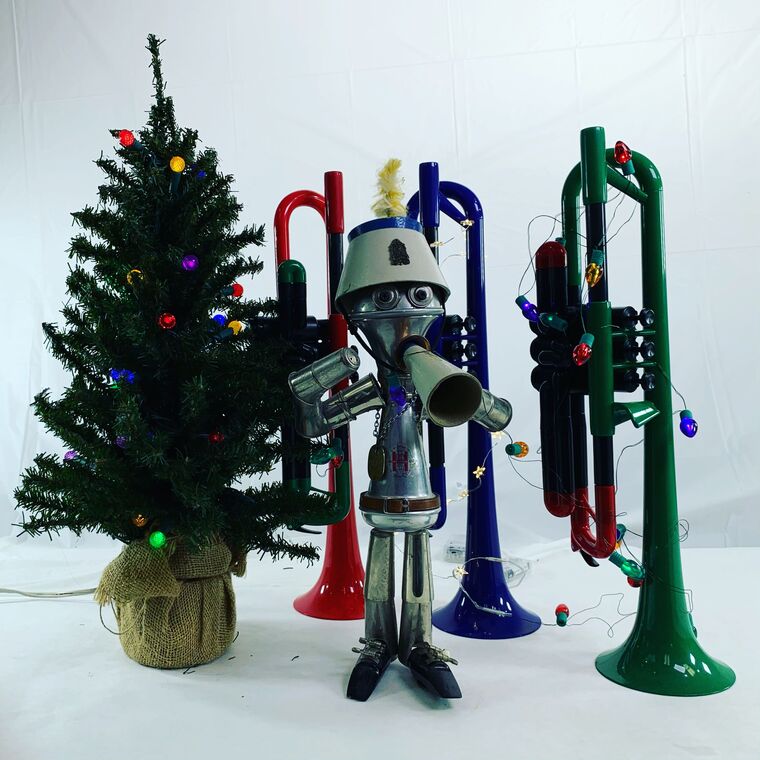
-
RE: Increase high range by 4 notes in 6 weeks?posted in Range
Range building should be a long term goal, not a short term goal. Musical Directors can hope all they want, but you can only build what you can build, and we’re all different. Don’t hurt yourself to force out some unreliable pitches that aren’t part of your regular daily ability. Build what you can and find a musical way around the rest - your audience will thank you, and so will your chops!
-
#AmandasBenchposted in Historical & Collector's Items
I figured I would add to this discussion by posting a link to my shop’s page - I do fairly regular blog posts there, usually about the more interesting horns that cross my bench. I’ve had a few that belong in this category because even though they might be in perfect shape, they don’t function properly in a modern playing situation. This one is a prime example - perfect and beautiful but not a good player, probably why they didn’t make it for long! It sold easily to a collector, though.
https://www.brassandwinds.com/blogs/news/1921-conn-20a-flugelhorn -
RE: How do I begin to learn "jazz trumpet?"posted in Jazz / Commercial
I second a lot of what has been said here, but would also add that iReal pro is much better for backing tracks than the others mentioned. You can download a huge library of tracks, and use them in any key you want, unlike Abersolds, which sometimes do standards in weird keys. You can also play them in any style, so when you learn more and want to get creative the options are open. It’s also easy to create tracks to go along with books of licks or scales.
Another thing I would highly recommend is finding a big band to play in if you can. One of the things that really changes between jazz and classical are articulations and cutoffs. Spend some time in a section following a decent lead player and you will get better at both. Check out Craig Fraederich’s books - the theory book sets things up pretty simply for jazz beginners and has playing exercises to go along with the written activities. He also has some free stuff on his website that is excellent.
Biggest thing, listen constantly!! Also, listen to more than just trumpet players

-
RE: Vintage Bach Clubposted in Vintage Items
Funny how no one is shaming fat old men in speedos.......
Really, though - what’s the problem with old ladies with tattoos? I intend to be one eventually, and feel zero shame about it. -
RE: Building and Repairingposted in Suggestion Box
Technicians tend to keep our info to ourselves because we’ve seen what happens when DIYers work on stuff, and it’s almost never good. It can be hard to guide a good apprentice right in front of you, and even harder to guide anonymous folks on the internet. There’s a reason we go to school and/or apprentice with good techs - it’s a hard trade to learn! Not only do we not want to lose any possible sources of income, but we also want to save you from breaking more than you fix and having a higher repair bill in the end. We also don’t want to be blamed for giving you just enough info to be a danger to your equipment, and then be blamed for it. The same goes for pro players/teachers, although it applies more to lost income. There are many players doing some kind of YouTube free lessons, but you don’t end up with the full benefit of the lesson without feedback from the teacher. Sometimes it’s just enough info to be dangerous as well, depending on the student and the lesson.
I’ve been getting paid to play for 35 years, and as a tech for 3.5 years. Neither pays enough that I live any sort of glamorous life, though having the benefit of a pension from my career in Navy bands has made my repair career a possibility. During COVID, both pro musicians and techs have suffered, many to the point of needing to change careers. Many have not only lost income, but also gigs that would advance their careers. I definitely lost two gigs due to Covid that would have helped me quite a bit! Many techs that lost business have also had to deal with the possibility of being exposed to Covid through customer horns - not an easy living, for sure. Since I work on horns before they go up for sale, I try to send as much business to local techs as I can. If you don’t use them, they may not be there to help when you need them! -
New Bench postposted in Historical & Collector's Items
I thought you all might enjoy my latest bench post - I do certainly get to work on some fun stuff!
https://www.brassandwinds.com/blogs/news/what-s-on-my-bench-a-1904-conn-connquerer-cornet -
RE: Most bang for your buck!posted in Instruments Discussion
It’s fine to say “buy the best”, but then we have many other arguments on what is the best and why. When you get into professional trumpets, you don’t necessarily get into better quality for every dollar spent. You do get to the point of buying one instrument over another because it suits you better. A prime argument is that I could spend $1k more for a Bach or Yamaha than I did for my Adams A1, but they don’t suit me as well. Then we get into the vintage horn argument - is it really a bang for your buck if it’s a pro model and costs you less, but is worn to the point of being unplayable. There is a Connstellation on my bench that I would never think of gigging on, but I could grab any one of those Jupiter 1100s and have a successful gig tomorrow. In 5 years my chances would still be better on that Jupiter than on some of the worn out Bach Strads we’ve had that badly need a valve job, though the Jupiter may not have the same resale value as either of those horns. Are we looking for resale value or playability? Good questions to consider!
I also agree with comments about Manchester Brass and Carolbrass - nice players at their price point. -
RE: Favorite Cornetposted in Flugelhorns & Cornets
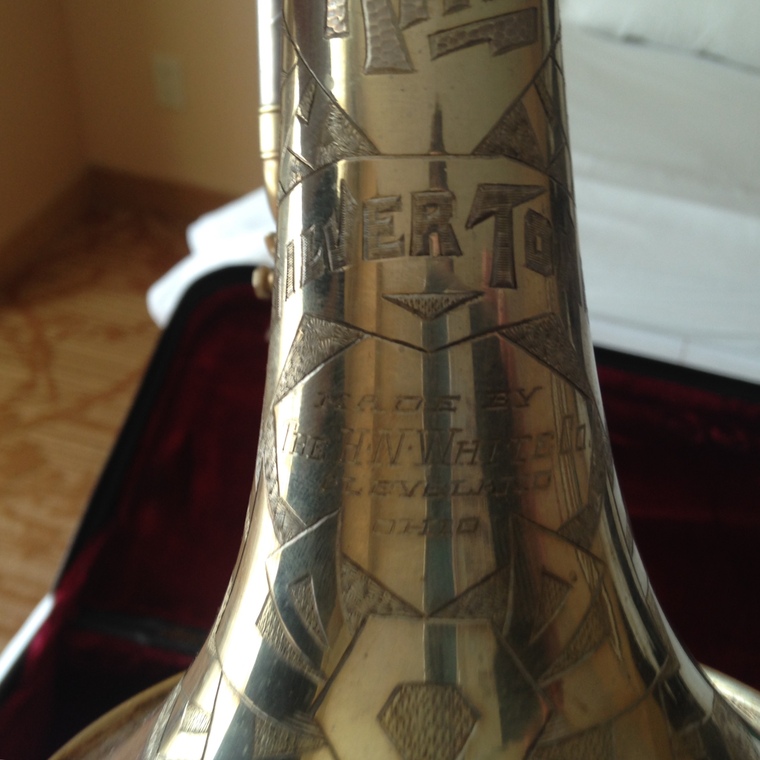
Finally found that on iPad, if I resize to square the pics will upload!! 1939 King Silver Tone Master cornet, silver finish with gold accents. Love how this one plays!! All it needed was a clean, and even came with original case and case candy. -
RE: Opinions on Valve Oils?posted in Instruments Discussion
I find most of the synthetics to leave a lot of residue over time, especially with horns that don’t get cleaned. If you don’t like to clean regularly, Hetman is not for you. It will degrade into a sticky yellow residue that is not fun to clean up! Yamaha synthetic likes to become a green cement in horns that sit too long, even new ones. It works great until you let it sit a few months, and then is best cleaned out in a chem clean. I like the Berp products because they stay very clean, tend not to react with other oils, and I have not had a horn freeze up in storage in over 10yrs. There’s nothing wrong with using synthetics, but for any you use, clean regularly, and be sure to clean out all old oil before switching brands - this includes brand new horns! Many synthetics will react badly when mixed with other synthetics or petroleum products - I have had customers return instruments only to find out they mixed two brands of valve oil and there are beads of goo in all the pistons - really annoying, especially when the customer has caused damage I have to fix when they cannot get the pistons out! This happened recently with a brand new Yamaha. Customer had applied Ultra Pure without cleaning out the Yamaha, let the horn sit for two days, and then freaked out when the pistons were frozen. Swore up and down they “did nothing to it - it works on all my other new Yamahas!” Got it back withbadly scratched pistons from being forced out improperly, and big balls of goo where the oils had reacted. Brand new horn that had to be repaired and sold as used because someone couldn’t be bothered to clean out the old oil.
-
RE: C. G. Conn Clubposted in Vintage Items
Here’s my newest addition - a 1947 80A. Plays as pretty as it looks!
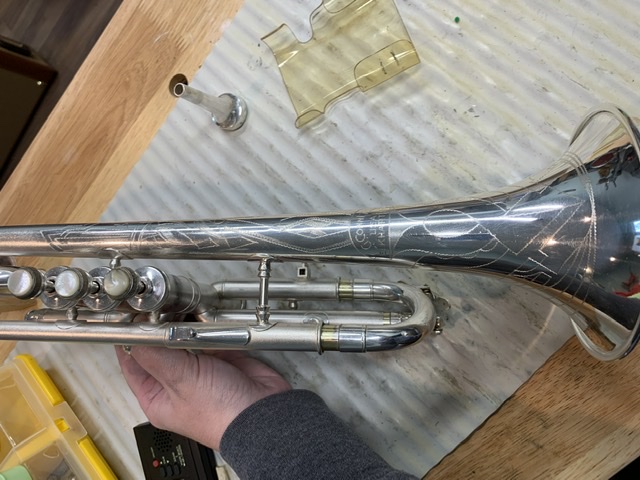
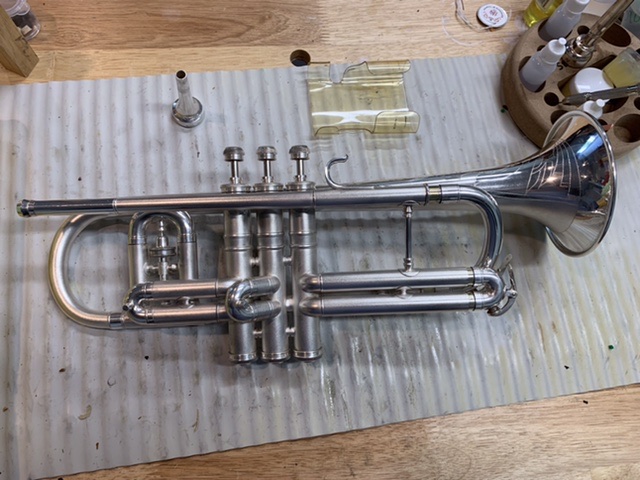
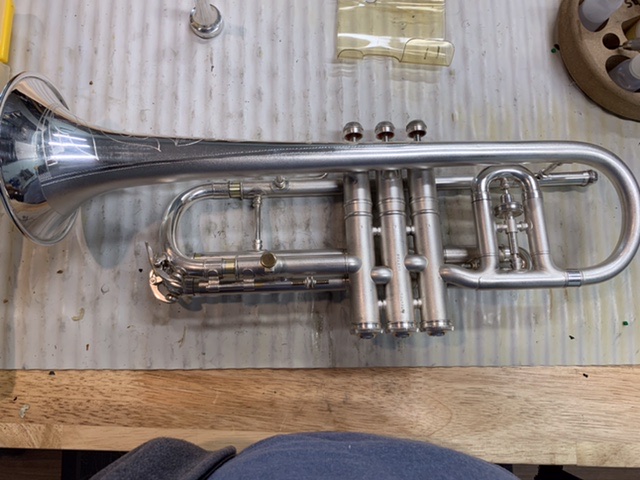
-
RE: Trumpets Made ONLY by Their Makerposted in Bb & C Trumpets
@Kujo20 Josh Landress does build his own, and while pricey, they are super nice! As for Puje, my consult with Brent was similar to Dr GO’s consult with Harrelson. The result of my consult and build with Brent is now the Puje 3AM - my initials, in case anyone wondered, not 3 in the morning

-
RE: Keying ~fingeringposted in Etudes and Exercises
Using flat fingers can mean uneven wear on your pistons and casings, which will eventually slow them down and cause you to need a rebuild. Nothing is worse than to try to play a trumpet with correct hand position that someone else has played with their knuckles for a long time - the only way the pistons will respond is if you play with your knuckles, too. If you value resale at all, try to keep your fingers curved and on the buttons.
-
RE: Taps on a real bugle (as per my post on Facebook)posted in Miscellaneous
The recording in an electronics bugle can make mistakes and does - I’ve heard plenty of Honor Guards complain about them playing scratchy, sound dying away as batteries die, and even playing twice without pressing the button. I also had a few people tell me how wonderful I sounded even though they “knew it was fake” during my time in the Navy, and I had to tell them that I actually just played for real......
As far as bugle vs trumpet, it’s up to you. Most military bands use trumpets. Most bugles are not built as well as my trumpets, so I feel no need for a bugle. I have gotten hired to play Taps a lot since I retired, and no one ever complains. Play it on the horn you play best on - no one cares as long as you sound beautiful! -
RE: Differences between grades of instrumentsposted in Bb & C Trumpets
Some pro instruments are not suited to beginners at all, and will actually make the learning experience more difficult. Many pro models these days are built with a particular pro player’s needs in mind and are difficult to handle for a student whose needs are “easily playable” and “durable”. I find that when young students come in looking for their first upgrade, something middle-of-the-road usually plays much better and easier for them than any of the pricier signature models, for example a Yamaha 8335 vs. a Yamaha 9335 series. Not only will they not understand the nuances of the more expensive models, but they will likely also have a difficult time playing them. Something to keep in mind when shopping for new horns as you improve as a player.
I really don’t think vintage horns had a higher quality level for intermediate vs. pro - some of those were still no more than fancier plating. The most important thing when looking at vintage is condition. If it’s been played to death or knocked around a lot, it will need some serious work to be brought back into playing condition, and may end up costing as much or more than a new horn when finished. It also may not be able to sell for enough to recoup your investment if you decide to switch to another horn. Also, no matter what the reputation, there is no magic in any horn. A Martin Committee in perfect condition will not make you sound like one of the greats if you are a marginal player, OR if it doesn’t suit you, though you may be able to sell it for what you paid if you don’t like it. A new Yamaha pro model you played and didn’t like will also hold a significant amount of its value. A restored vintage horn will only hold its value if the restoration is done very well, and if the model already commands higher prices. Stuff to think about as you play, practice, and shop. -
RE: Easter Servicesposted in Classical / Orchestral
@barliman2001 all the parts sent to me were for Bb, but I took the quad to rehearsal anyway just to be safe. Good thing I did, because picc made the additional music handed out much better and easier for me! I learned my lesson about not taking everything after I got stuck transposing Bb parts on C trumpet. I’m much more proficient playing C parts on Bb!
-
RE: Different Techniques For Different Instruments?posted in Embouchure and Air
Yes -air control is key. Overblow a flugel and not only will you be sharp, but you’ll also lose the characteristic sound. Same with cornet, and intonation is very different to control than trumpet. Just because it has 3 valves and is in Bb doesn’t mean you can approach it the same way.
-
RE: Mute Musingsposted in Mouthpieces & Accessories
Corks are meant to be sanded so they properly fit the bell. Since bell flares can be very different, sometimes when you get a new horn you need to replace your mute corks. Mutes that fit my last daily player well needed replacements to fit my current horn correctly.
